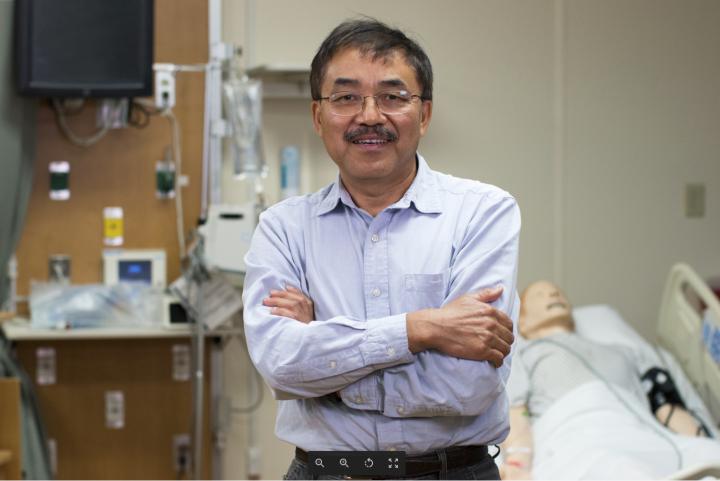PROMIS lab takes on medication misuse

Credit: UT Arlington
Each year, U.S. hospitals record more than 700,000 emergency room visits and 100,000 hospitalizations due to preventable medication-related harm, according to a study by the National Electronic Injury Surveillance System. The problem is particularly acute among patients 65 and older.
Yan Xiao, a professor of nursing and patient safety specialist in The University of Texas at Arlington’s College of Nursing and Health Innovation, is developing interventions to reduce unsafe use of medications.
His research is funded by a new four-year, $2.5 million grant from the Agency for Healthcare Research and Quality, or AHRQ. The agency is a division of the U.S. Department of Health and Human Services and funds a national network of patient safety learning laboratories.
Xiao oversees the Partnership in Resilience for Medication Safety Learning Lab, or PROMIS lab, a consortium project led by UTA. Other members include Johns Hopkins University, JPS Health Network and the University of North Texas Health Science Center.
Xiao is the project’s principal investigator. Co-principal investigators include Kathryn Daniel and Jing Wang, associate professors in the College of Nursing and Health Innovation; Kay-Yut Chen, professor in the College of Business’ Department of Information Systems and Operation Management; and Yuan Zhou, assistant professor in the College of Engineering’s Department of Industrial, Manufacturing and Systems Engineering.
As part of their strategy to improve medication safety, Xiao and his fellow researchers will conduct interviews, focus groups and design sessions with 100 older adult patients and 50 health care professionals, including physicians and pharmacists, at 12 clinics around the country. They also will use UTA’s Smart Hospital to simulate and test interventions.
“More than a third of older adults are taking five or more prescription medications and are challenged by managing medication safely at home,” noted Daniel, who also is the director of the Adult-Gerontology Primary Care Nurse Practitioner Program at UTA.
In this consortium, UTA will provide extensive multidisciplinary expertise, including geriatric nursing, system engineering, behavioral economics and health care simulation. The other consortium members will offer expertise in pharmacology, family medicine and health services research. They also will help provide access to a network of primacy care clinics in the Dallas-Fort Worth metroplex and around the country.
“”The whole focus is on medication safety through a partnership approach,” Xiao said.
“The PROMIS lab will work with primary care clinics and community partners to engage clinicians, older adults and their caregivers in design cycles. The interventions developed will be tested and evaluated in simulated and actual primary care settings.”
Chen’s role in the research is to ensure the best behavioral science is employed to enhance medication safety.
“We are trying to enhance the decision-making process, increase good decisions and raise compliance in a patient’s health care,” said Chen, who arrived at UTA in 2014 as a renowned behavioral and experimental researcher from Yahoo! and Hewlett-Packard.
Xiao, who joined the UTA faculty in 2017, is a respected patient safety expert. He has previously documented the struggles of patients and their caregivers in managing medications and following discharge instructions. For several years, he and his team of researchers have visited patients after hospital stays and interviewed doctors and nurses as part of their efforts to design a system that boosts patient safety following hospital stays.
Xiao is hopeful the consortium will have the safety interventions designed within the next two years.
“The issue of unsafe use of medication is more critical than ever because of our rapidly aging population,” said Elizabeth Merwin, dean of the College of Nursing and Health Innovation. “It presents our patients and health care systems with serious challenges. This grant will provide a significant boost to Yan Xiao’s efforts to help tackle this issue.”
###
Media Contact
Elizabeth ‘Lizzie’ Couch
[email protected]
817-272-2748
Original Source
https:/




